News & Events in Belarus
Premier’s report, down-to-earth concept, trade unions, Lukashenko in Dzerzhinsk in President’s Week
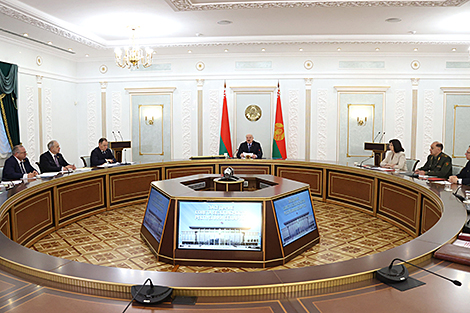
The work schedule of the Belarus president is always full of events. Aleksandr Lukashenko holds conferences and working meetings on the most topical matters concerning the country’s development, regularly visits the regions, goes on foreign trips and welcomes foreign guests, talks to reporters, signs decrees and laws. And even if there are no public events, it does not mean that the head of state does not work. It must be said that even when he relaxes, for instance, by playing ice hockey or chopping firewood, Aleksandr Lukashenko happens to find the time to give yet another instruction. All the decisions must be prompted by life, he likes to say.
The President’s Week project is intended for those, who want to keep up with the head of state, be up-to-date on the latest statements and decisions of the Belarusian leader.
The head of state began past work week by hearing out a comprehensive report from Prime Minister of Belarus Roman Golovchenko. The country’s economy seems to be doing well this year, but there are a number of reasons for concern, to which Aleksandr Lukashenko drew the prime minister’s attention.
On Tuesday, 18 June the president hosted a session of the Security Council. It was necessary to “ground” Belarus’ National Security Concept that had been previously passed by the Belarusian People’s Congress by working out the relevant documents and criteria to evaluate the situation. Although this part of the matter is still quite confidential, participants of the meeting shared some details. Before the meeting the president examined samples of new military uniforms.
The next day the head of state met with Chairman of the Federation of Trade Unions of Belarus (FTUB) Yuri Senko, who delivered his first report after getting the job. Among other things Belarusian trade unions were encouraged to strive for the better, to respond to questions and needs of the working class without excessive bureaucracy. But there were also a number of concrete practical instructions concerning working retirees and assistance for agrarians. The useful experience the head of the federation acquired while working in Beijing for years could also be useful in Belarus.
The Belarusian leader always keeps an eye on agriculture. Particularly since the harvesting campaign has begun in the country, particularly in southern partners. This is why Aleksandr Lukashenko heard out a report from Chairman of the Brest Oblast Executive Committee Yuri Shuleiko on Wednesday.
In conclusion of the work week Aleksandr Lukashenko went to Dzerzhinsk District on a working trip. The unique experience of Minsk Oblast was discussed. The city of Minsk had donated 20 modern dairy complexes to the oblast. Prospects of development of satellite cities, the construction of housing, infrastructure, and sport facilities were also discussed. The president made a few comments about Belarusian football and evaluated performance of the teams during a European championship. He also mentioned what he dreams about at night.
Important events of the week also include Aleksandr Lukashenko appointing Deputy Chairman of the Council of the Republic of the National Assembly of Belarus Sergei Khomenko national coordinator for reaching the Sustainable Development Goals. The second national forum on sustainable development took place in Minsk. The head of state sent greetings to participants of the forum. He mentioned the high positions that Belarus occupies in this global project.
Representatives of various spheres of activities and not only in Belarus had a reason to feel joy for themselves and their colleagues after Aleksandr Lukashenko signed a number of award decrees.
More substantial attention will be paid to the work of Belarusian scientists: the president signed an executive order to set up a permanent working group in charge of analyzing the operation of the National Academy of Sciences of Belarus. The practical orientation and results of scientific research and development projects, their assimilation by branches of the national economy and the social sphere will be evaluated among other things. The president is supposed to get a report every year.
OKAY ECONOMY. What shortcomings did Lukashenko point out?
On 17 June Aleksandr Lukashenko received a report from Prime Minister of Belarus Roman Golovchenko. “I receive reports that the economy has been doing well so far this year. Although there are certain alarming things, as always. I would like us to pay attention to this, first of all. What is even more important is that we have a trade deficit. Mass media of various levels report it. Although this deficit [in foreign trade] is small. As I see it, the Economy Ministry and the government should have paid attention to this and should have analyzed this situation,” the head of state said.
He also wondered about the situation with payments, namely receivables and payables.
The report also covered another financial topic: the fulfillment of debt obligations.
Aleksandr Lukashenko asked about progress in implementing plans to arrange aftersales service of Belarusian vehicles, machines, and equipment abroad: “We have agreed that we need to set up single centers for servicing all Belarusian equipment, and we also need to decide where we should do it such as in Russia, the People’s Republic of China, and other states.”
“I am told that we have certain problems with housing construction. Well, there are also a number of other shortcomings we should pay attention to,” the Belarusian leader noted.
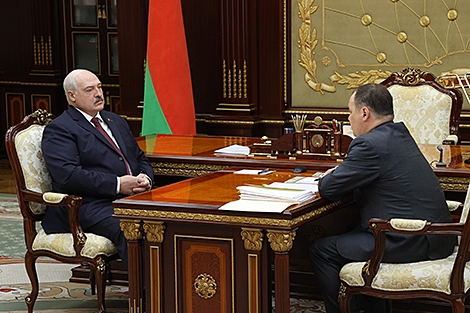
The president spoke at length about the situation in agriculture. “We need to mobilize. The weather is good so far. God willing, it will continue to be like this. We expect a good harvest, but we need to work hard for it. We could use some extra grain. It might come in handy. This is akin to our gold and foreign exchange reserves,” the Belarusian leader emphasized.
Aleksandr Lukashenko also mentioned readiness to discuss personnel matters with regard to existing vacancies.
“As we are approaching the end of the first half of the year, I would like to report to you on the country’s economic performance,” the head of government said.
The president warned right away that these matters will be revisited after H1 2024 as well.
“We have the data for January-May. We already see how six months will turn out and, in general, we project results of the year. In January-May we hit four main social and economic development targets out of five: GDP growth rate totaled 105.2%; investments amounted to 109.6%; real incomes of the population (which is very important) to 109.8%, and the consumer price index remained within the projected scenario – 2.8% since the beginning of the year,” Roman Golovchenko said.
As for the fifth target – export growth – the country has yet to reach the desired results. But the numbers are still higher than last year’s. In January-May the export growth rate totaled 102.1%. “We were a little short of the targeted 104%. Growth was mainly secured by means of increasing the physical volume of export by 8.7%,” the prime minister reported.

While talking to reporters after the meeting Roman Golovchenko stated that the external situation is not getting easier: the pressure of sanctions remains in place and attempts are being taken to make these measures even tougher. “We understand that the sanctions will stay for a long time, so we build our policy with this in mind. Despite everything Belarus’ export is rising,” he said. “We have to accomplish all the tasks assigned to the country’s economic team. We need to increase export just a little. But the situation has been quite good so far and I think that with proper internal mobilization and focus on results, we will hit all the targets.”
“TO GROUND” THE CONCEPT. How will the state of Belarus’ national security be evaluated?
On 18 June the president convened a session of the Security Council as a follow-up to the new National Security Concept recently adopted by the Belarusian People’s Congress. Members of the Security Council had to consider a draft regulatory act on matters concerning the evaluation of the state of national security.
“As you remember, the need to revise the relevant normative legal acts in furtherance of the new National Security Concept was mentioned at the 7th Belarusian People’s Congress,” the president said. “We said that the National Security Concept is a public document. We studied it thoroughly, reviewed it at dialogue platforms, and then approved it at the Belarusian People’s Congress. But in furtherance of this concept, which mainly contains general guidelines and theories, it is necessary to pass statutory and regulatory enactments to concretize and bring it down to earth.”
In fact, these documents are an integral part of the concept, but according to the established practice they are confidential.
“The concept has been approved. Our national strategic interests, threats, priority areas of their neutralization, the general vision of further development in the sphere of security have been defined. Everything is as clear as it gets. The Republic of Belarus is a peaceful country that is always open to an equitable dialogue and mutually beneficial cooperation. We have never threatened anyone. Moreover, unlike other countries we openly communicate our approaches to everyone. Whoever wants to hear it will hear it,” Aleksandr Lukashenko emphasized.
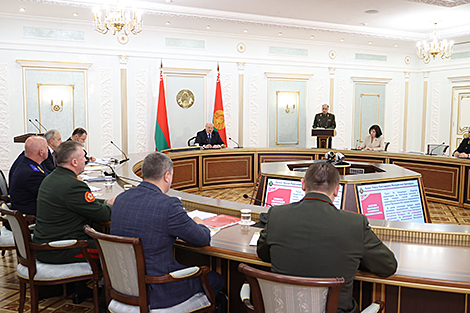
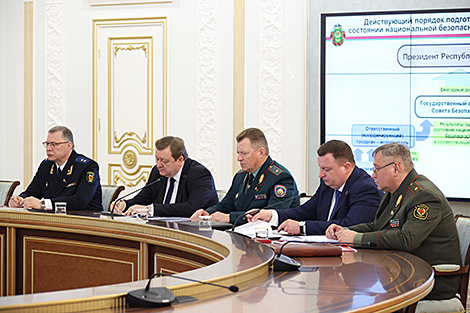
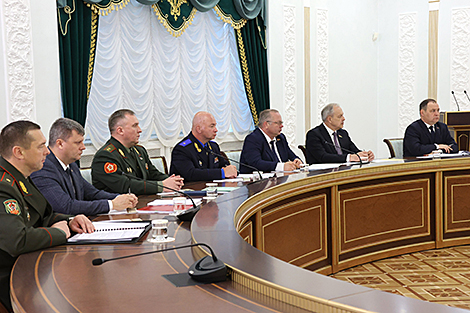
As for the relevance of the agenda of the Security Council’s session, the president explained it by saying the following: “We have said that it is not enough just to enshrine certain provisions in normative legal acts. It is time to put these approaches into practice. In other words, we need a clear perception of what is really going on inside the country and around it. Military security, economy, social welfare, political spheres, and other sectors. Without embellishment and as verified and objective as possible.”
This is why Aleksandr Lukashenko raised a number of questions regarding the work done to improve the current system of assessing the state of national security; the proposed changes and their coordination with the new National Security Concept. He stressed the importance of making sure that the proposed assessment system reflects the real state of affairs in every area of national security.
“You know our requirements: there should be no formalism and oversimplification here,” the head of state stressed.
State Secretary of the Security Council Aleksandr Volfovich, Economy Minister Yuri Chebotar, and Defense Minister Viktor Khrenin presented their reports during the session.
The State Secretariat of the Security Council has developed a draft presidential decree on approving the documents needed to implement the National Security Concept of the Republic of Belarus. It is the next important stage of improving the legislation in this area after the concept’s approval at the Belarusian People’s Congress. “The purpose of the document is to take into account new changes and clarify the procedure for assessing the state of national security on the basis of a system of indicators developed for each of the nine sectors of national security,” Aleksandr Volfovich said. “Work on the draft decree was organized similarly to the work on preparing the National Security Concept. We have kept the best practices in the document, everything which proved efficient, and some new things. We have also taken into account new proposals and have proceeded from the current situation.”
Despite a number of additions the structure of the document and the general algorithm of work remained largely unchanged. As before, every sector has its responsible coordinating body and executing bodies, which, in accordance with specified indicators and their threshold parameters, have to analyze and propose an appropriate assessment. As before, the state of national security in every area is assessed according to three criteria: stable, unstable, and in need of urgent measures. The approach corresponds to the concepts of risk, challenge and threat to national security enshrined in the document.
Belarusian Defense Minister Viktor Khrenin told reporters that the ministry had developed new methodology for evaluating military security. “It is objective, comprehensive, and timely. It is tied to matters of politics and economy, which are important factors,” the minister stressed.
As for economic security, while discussing the matters, members of the Security Council focused on social, economic, demographic, scientific, and technical directions. “We are concerned about matters relating to export diversification, to evaluating the performance of the economy in comparison with other countries. This is why we have suggested the relevant additions, indicators that would give us a more objective evaluation in this sphere,” Economy Minister Yuri Chebotar noted.
UNIFORM REPORT. Why was it necessary to change uniforms of military personnel?
Aleksandr Lukashenko examined prospective samples of new items of uniform for military personnel before the session of the Council of Ministers in the Palace of Independence.
“What’s new about it? Why are you not satisfied with the existing uniforms?” Aleksandr Lukashenko wondered.
The head of state was told that the changes had been prompted by world trends, the transformation of the combat and training missions that military personnel have to carry out, and by the need to unify individual items of the official uniforms worn by different categories of military personnel. According to Deputy Defense Minister for Logistics, Chief of Logistics of the Armed Forces Andrei Burdyko, the suggested changes will allow expanding the functionality of military uniforms. The uniforms will be convenient to wear considering the peculiar nature of the tasks military personnel have to carry out.
Some parts of the uniforms now have a different structure to give more movement freedom to military personnel in the course of carrying out their duties. The protection of knee joints and elbow joints has been improved in combat uniforms.
All the novelties – the list and names of the articles of military uniforms, their color range – are stipulated by a draft presidential decree. A tactical shirt, a fleece jacket, a summer neck scarf and a winter one for combat uniforms are slated for production. Fur collars of winter jackets will be replaced with textile ones. The piping in the uniforms of the interior troops of the Internal Affairs Ministry will be maroon as a tribute to traditions.
Women in uniform will get dresses, a hat, and a neck tab in addition to their everyday uniforms. They will be issued demi-season ankle boots in autumn. Cadets of military education institutions will get so-called office sets that consist of a jacket and trousers. They will have to wear current everyday uniforms with a service coat for festive events. Cadets and soldiers will be issued T-shirts in summer.
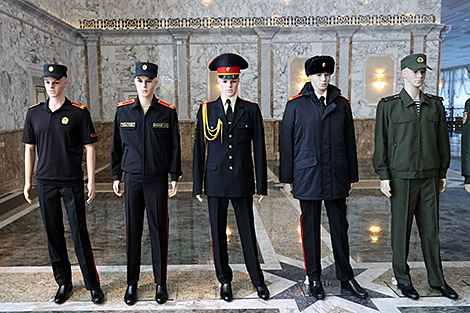
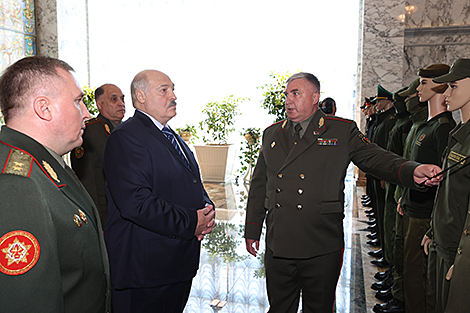
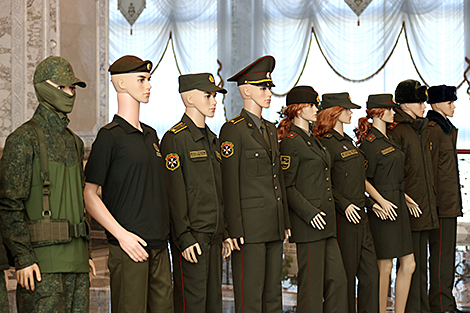
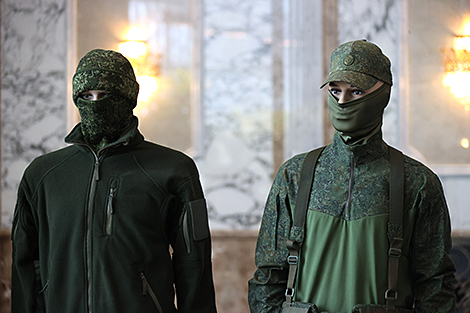
The Defense Ministry believes that it is necessary to redesign the uniform worn by cadets of Suvorov Military School. The current uniform was approved in 1996. The new one will resemble the uniform of other cadets but will have usual darker colors. The changes will be stipulated by a separate presidential decree.
“How much will it cost?” the head of state asked for clarification.
“The costs will stay the same due to the extension of the standard wearout time and due to the replacement of other articles of clothing,” Andrei Burdyko said.
He added that the new models had been handed over to the troops for practical testing. Wishes and proposals of military personnel were taken into account in the course of making the uniforms.
“It is good that you are satisfied. You don’t ask for more money. We will do it,” the president concluded.
Yet Aleksandr Lukashenko remarked that there is no need to wait for years if the need to improve uniforms arises. These matters should be addressed promptly, he stressed.
The troops are expected to get the new uniforms in Q3-Q4 2024 once all the necessary regulatory acts and intradepartmental documents are adopted.
It is worth noting that all the uniforms have been made by Belarusian enterprises using Belarusian fabrics. Flagships of the textile industry took part in the manufacturing process: Mogilev-based Mogotex and Minsk-based Kamvol. A total of about ten clothing industry enterprises took part in this work.
WORKERS’ “PARTY”. What does Lukashenko want trade unions to focus on?
On 19 June the head of state received a report from Chairman of the Federation of Trade Unions of Belarus Yuri Senko. The former ambassador to China and the former chairman of the State Customs Committee was chosen for this position on 5 April.
Aleksandr Lukashenko said: “I did not invite you and did not meet with you in this period of time after election [to the position of the FTUB chairman] for a reason. I wanted you to get up to speed. Before we could meet, I wanted you to get to know all the minor details and processes going on in our trade unions. There is no need to remind anyone that it is a huge ‘political party’ in a manner of speaking. An overwhelming majority of these people are statesmanlike and patriotic. But there are quite many complaints about trade unions both inside the trade union organization and on the part of the population. They are criticized for doing too little, for having too much red tape, for failing to provide aid and support and the rest. It is natural since this organization is huge. It will always be like that. But it is necessary to aim for the better. It is necessary to reduce this bureaucracy and the rest. Because this is a people’s ‘party’, people’s trade unions.”
Aleksandr Lukashenko wondered about the state of affairs in trade unions since Yuri Senko had been offered an opportunity to take a fresh look at things. He wondered about future plans and suggested actions meant to normalize the situation in several areas.
Yuri Senko reported that the national trade union center had matured as an association and now includes 15 industry-specific trade unions. “Universal approaches are needed in order to reach every worker as much as possible and identify their problems. And we can identify them. Because as many as 24,000 basic trade union organizations have been created in the country. It is a big army,” he said.
Enterprises and organizations have signed about 18,000 collective bargain agreements, which offer a lot of advantages and stimuli to employees even on top of what the legislation requires.
Aid to agrarians
Aleksandr Lukashenko asked the trade unions to take an active part in the forthcoming harvesting campaign.
Aleksandr Lukashenko said: “The harvesting campaign has virtually started. I heard out a report from the Brest Oblast governor today. He has already started gathering in winter barley in some places. Trade unions have always participated in this process and provided relevant aid and support. I’d like you to provide first and foremost assistance, support and involvement of trade unions in this work instead of some observation and oversight functions. We have plenty of oversight agencies.”
The president recalled his previous work in agriculture: “Trade unions were always my right hand. Particularly in agriculture. And we worked together to organize meals and maintenance [of machines and vehicles] during the harvesting period.”
The president also gave instructions to keep an eye on the payment of wages so that workers would have no reasons to complain.
Stimuli for working retirees
During the meeting the head of state gave instructions to introduce additional financial stimuli for working retirees. The suggested innovation will adjust things bearing in mind the individual earnings ratio (IER). At present pensioners, who work, are not paid a pension above the IER of 1.3.
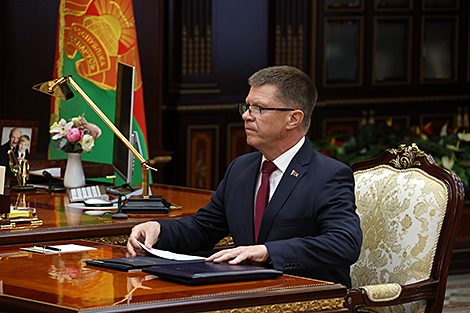
“One of the items on the agenda today is remuneration for working pensioners. Our country’s president has given instructions to accomplish this task as early as in Q3 2024. For instance, a person retires and gets the IER of 1.45. According to the legislation, the person cannot get the pension money past the IER of 1.3. So he or she misses this difference. The only exception is agricultural workers,” the chairman of the Federation of Trade Unions of Belarus said.
This is why an instruction was given to introduce a regulatory act that will allow pensioners to continue working, but on more attractive terms. Yuri Senko is confident that retaining the earned ratio will be a great incentive for people with extensive work experience, professional skills, energy and the desire to continue working. “Plus, their wages will also be a good incentive for them to keep working in those areas where we need them,” Yuri Senko added.
A Chinese example
As he heard out the report from Chairman of the Federation of Trade Unions of Belarus Yuri Senko, Aleksandr Lukashenko also mentioned Belarusian-Chinese relations taking into account the fact that the trade union leader had been Belarus’ ambassador to China for several years.
Aleksandr Lukashenko said: “Your Chinese experience is very important for me. Because trade unions can walk away from the reality of life at times and come up with unwarranted demands. I always support workers. It is truly the right approach. But you know, in order to demand something, you have to work hard. And you’ve seen how the Chinese work. Certainly, our people don’t work as hard and it is unlikely they will. But if our performance and volumes were close to those of Chinese workers, I think we could be several times richer. This is why this experience is very important for the trade union leader himself.”
The president wondered how Yuri Senko had settled down after returning from China and whether he had any personal questions.
In turn, Yuri Senko thanked Aleksandr Lukashenko for the unique experience accumulated over the years of working in China. He assured that the three years had not been wasted. The diplomat visited about 30 provinces, virtually the entire China. “I know the situation. People everywhere in China know us, hear us, understand us, appreciate our friendship and our relations. I am convinced that the solid friendship will last for a long time and will produce results,” the FTUB chairman said.
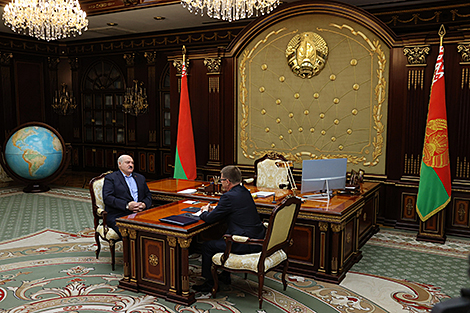
Aleksandr Lukashenko warned that in addition to taking care of his main job as the FTUB chairman Yuri Senko will be in demand as an expert and even a participant of some processes relating to Belarus’ relations with the People’s Republic of China.
The same approach may be used to customs affairs since Yuri Senko headed the State Customs Committee before moving to China. “You worked there for a long time. And we will always need your fresh outlook on various matters. An independent outlook. Maybe even an alternative one,” the Belarusian leader remarked.
“I am always ready to fulfill assigned tasks,” Yuri Senko assured.
COMPREHENSIVE APPROACH. What new ideas were demonstrated to Lukashenko in Dzerzhinsk District?
On 21 June the head of state went to Dzerzhinsk District, Minsk Oblast on a working trip. Attention focused on agriculture and social affairs. In particular, on two complexes: a dairy complex and a physical training and recreation complex. They make up the economic foundation of the district and provide additional opportunities for active recreation, for going in for physical training and sport. After all Dzerzhinsk is a satellite city of Minsk, this is why it has to live up to higher standards, as the head of state put it.
The head of state received an unusual sculptural composition as a gift in Dzerzhinsk – a shield and a sword. It is a reference to the city’s coat of arms and to Alexander Nevsky. The president gave instructions to leave this composition in Dzerzhinsk and to find the best location for it. “Let them know that I will also defend them. I leave it as a gift to Dzerzhinsk and residents of the city,” he said.
The head of state began the working trip by inspecting the territories from the air in order to evaluate the state of affairs and primarily the state of the crops after a recent hurricane. “I was worried that this hurricane would wreak havoc, especially to our crops. But god had mercy on us. Some fields were damaged a bit because of our stupidity: we put in extra fertilizers although the soil was already humid over there. But it is okay, we can handle it,” the Belarusian leader concluded later on.
A gift from the capital city to Minsk Oblast
In Dzerzhinsk District Aleksandr Lukashenko was made familiar with progress in fulfilling the instruction to build modern dairy complexes in Minsk Oblast. One of them is the Lyakhovichi dairy farm owned by the agricultural enterprise Krutogorye-Petkovichi.
The president explained right away that it was not yet another routine visit to a farm. Although the construction of modern dairy farms to replace outdated ones has been going on in Belarus for years and a lot has truly been done in this area, this case is special and it is a new topic, Aleksandr Lukashenko noted. The complex in Dzerzhinsk District is one of the 20 facilities of this kind in the region, the construction of which has been financed by the Minsk city budget. In fact, Minsk consumes a significant part of the products made in the region. This is why it needs to help the agricultural workers.
The practice may be adopted in other regions as well, but on a smaller scale. “Minsk consumes products not only from Minsk Oblast, but also from Brest Oblast, Grodno Oblast, and other regions. This is why when other governors learned that the 20 dairy complexes were built here, they howled: ‘Why in Minsk Oblast and not in Brest Oblast...?’ Indeed, why? Minsk consumes milk from Brest. Vladimir Yevgenyevich [Kukharev, Chairman of the Minsk City Executive Committee] implored: give me a year to finish things in Minsk Oblast, and then I’ll gift 1-1.5 complexes to every other region so that they would not hold a grudge against the Minsk Oblast governor,” the head of state said.
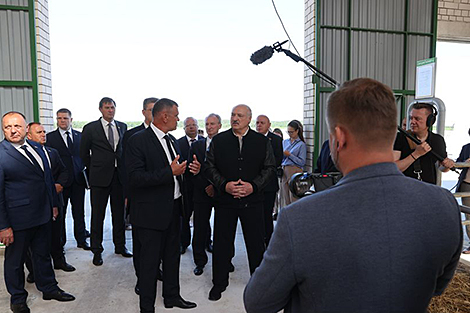
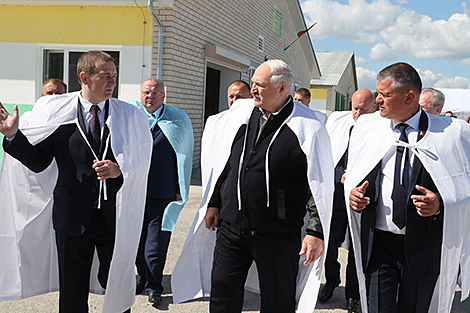
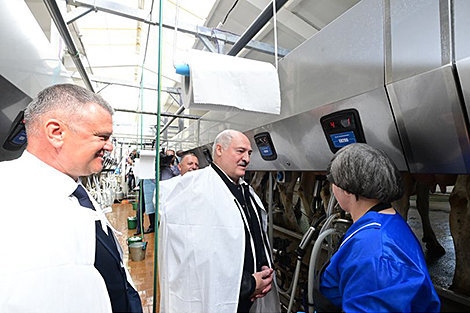
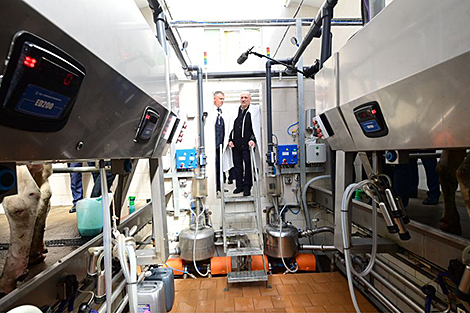
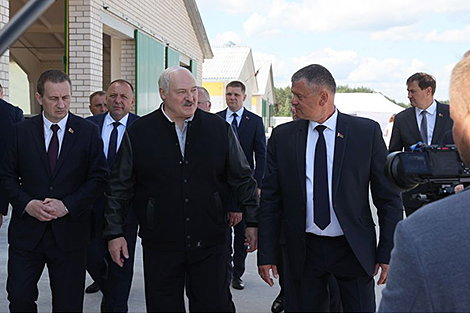
The second reason for the visit was that the complex in Dzerzhinsk District turned out to be optimal and relatively cheap to build. “This is the cheapest complex in the country. This is very important for us. We are commissioning more than a hundred complexes across the country this year. We need to clearly understand how much they cost us. If your complex is indeed the cheapest dairy complex (and it looks like that), we need to replicate these complexes throughout the country. We don’t need complexes with bells and whistles, extravagant architecture and so on. Just a nice design for a good complex. A beautiful, normal design. We will replicate it throughout the country,” Aleksandr Lukashenko instructed.
Social reasons behind the government’s support for the countryside
The president emphasized the importance of building more dairy complexes like this: “We will not stop building such complexes. If someone frets and giggles saying ‘here we go again with these complexes’... Again! All the milk produced here is of premium quality. Our people, including children, drink it. That’s why we have to move away from small farms towards building more such complexes.”
The approach is also determined by simple economics of manufacturing processes. The head of state was informed that cows give much more milk after getting transferred to the new complex. This is why the enterprise and its employees get more money. It allows the enterprise to shoulder additional social costs, which Aleksandr Lukashenko emphasized. For instance, there are tens of villages in the territory the agricultural enterprise Krutogorye-Petkovichi occupies. The enterprise has recently helped buy mobile shops in order to cater to the local rural population.
“Well done! I have already explained many times why we support agriculture, and why this is one of priorities of the government policy. Since the Soviet times it has been crucial for our country. We need to keep supporting the countryside,” the Belarusian leader emphasized. “It is necessary to think about social sphere. And pensions. And it is necessary to keep villages in good shape more or less. This is why it is necessary to provide assistance and rely on them. And it is necessary to support such executives. Morally and materially because they carry the burden in the district.”
The best job and the president’s night dreams
During the tour of the dairy complex Aleksandr Lukashenko once again confirmed his belief that working in agriculture is one of the best jobs there is. “There is no job better than that. Remember it. I’ve been through all of that. At night I dream about the people I used to work with. I dream about cows. I milk them at night… There is nothing better than that. No presidency [is better than that],” the head of state said. “It is the most interesting kind of job. Live people, live animals, live plants. And results every year.”
“You have to live by it instead of just going to work,” Director of OAO Krutogorye-Petkovichi Yuri Klimash agreed.
“Absolutely right,” the president confirmed.
Authors of various dream dictionaries say that seeing or milking a cow in your dream means the person will have stable wellbeing, success and accomplishments in business. Agriculture and animal husbandry occupy an important position in Aleksandr Lukashenko’s life. He had jobs in this field not only when he was an adult. It is commonly known that he helped his mother to milk cows at a dairy farm when he was a boy.
The opening of a “health factory”
Aleksandr Lukashenko took part in a ceremony to commission the sport and recuperation complex Olympus in Dzerzhinsk. Dzerzhinsk celebrated City Day at the end of May. So the opening of the new sport and recuperation complex in the district capital was, in a certain sense, a City Day gift for local residents.
Aleksandr Lukashenko emphasized that Belarusians should take their health more responsibly: “If every person, including a child, takes care of their health (at least at the bare minimum), they will no longer have to go to the pharmacy and to the hospital. We build health centers so that you would stay away from pharmacies and hospitals.”
The head of state expressed hope that similar facilities will be built in all districts of Minsk Oblast. “I think the oblast governor, who is a young, athletic man, will keep it up, and over the next five-year period we will get such facilities in every district. We have few districts with no complexes like this. Therefore, we should build them. This is a health factory. And I wish you the most important thing – health. We’ll buy everything else,” Aleksandr Lukashenko said.
Going to such a health facility can become the first step towards high-performance sport for some. “I will be very glad if with time I hear that champions of Europe, of the world, of the Olympic Games come from here. And it is possible: the healthiest people live in the regions,” the Belarusian leader noted. “Everything is available here for laying the base for athlete training.”
The sport and recreation complex has sections dedicated to football, basketball, judo, and table tennis. The opening of a swimming section is being considered. Residents of Dzerzhinsk and nearby villages will be given the opportunity to go in for sports.
As he was leaving the sport complex, the head of state was greeted by local residents. He urged them to get actively involved in sprucing up their home city: “After all, it’s a satellite city of the capital city. So join in.”
Aleksandr Lukashenko asked if they had any questions for him. But the people only wanted to express appreciation. “Please, don’t!” the president interrupted them. “I’m just doing my job. Therefore, live long, be healthy, play sports here.”
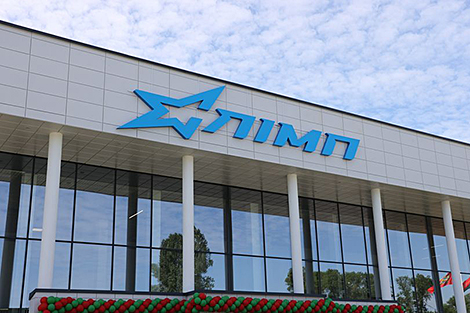
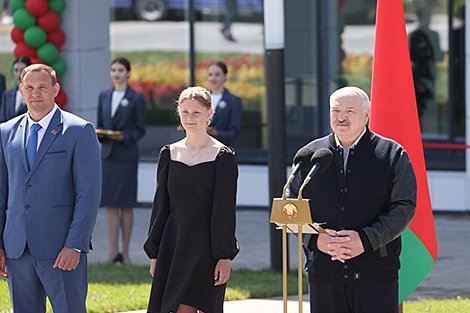
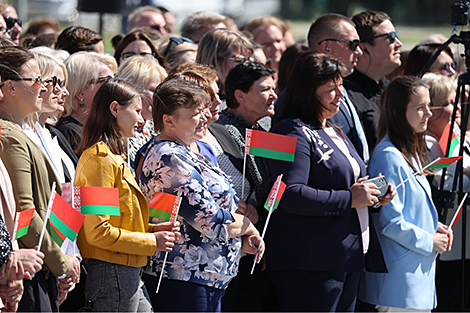
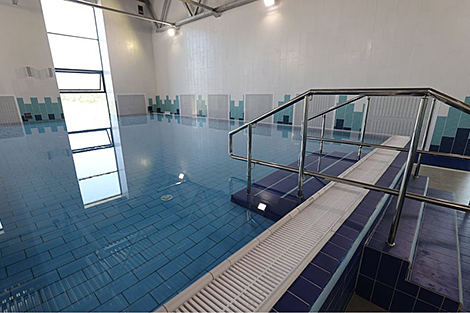
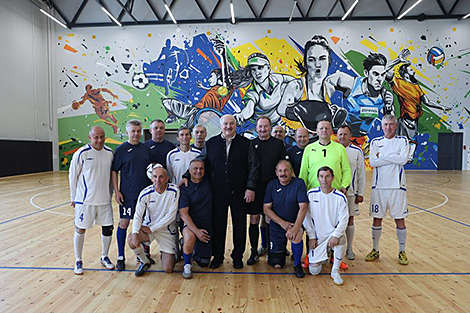
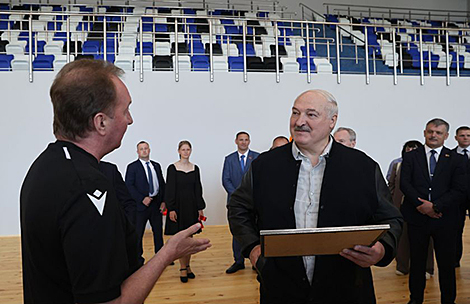
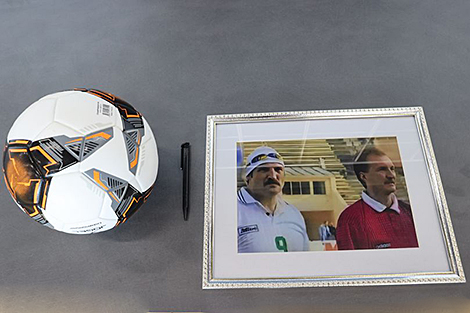
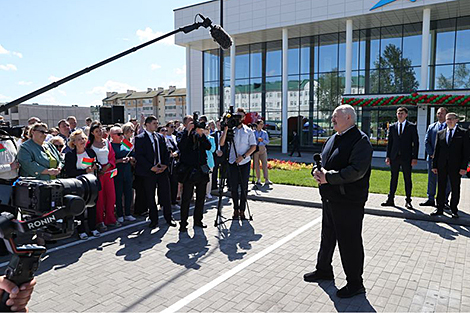
Prospects for Dzerzhinsk and other satellite towns and cities
The president admitted that he had been getting ready to visit Dzerzhinsk for a long time: “A lot of people from this district, who work nearby, have told me about the local problems that need to be addressed. About the things that need to be rectified and the things that need to be built. I had the time since large-scale harvesting has not started yet, so I thought it would be a good idea to visit your city.”
It was already noted that Dzerzhinsk is a satellite city of Minsk. It is one of the reasons why very serious efforts will be poured into the city’s development. The head of state assured: “We will not only build manufacturing facilities, plants and factories here. We will develop agriculture. It is in a good shape here. I don't see any problems with it.”
For instance, in the near future, perhaps in the next five years the government intends to at least start or even implement a long-held dream: to connect the capital city with nearby towns by high-speed railway service. “Let’s say Logoisk, Dzerzhinsk, Smolevichi. There should be a high-speed railway service there, so that a person can get from Dzerzhinsk to Minsk in 20 minutes. Then there will be no problems with commuting to work. A person can live in Dzerzhinsk (that looks like a resort town) and come to Minsk for work any time,” Aleksandr Lukashenko said.
“As for the manufacturing sector, there are enough enterprises here and people are starting to come back from Minsk. In the future we will support plants, factories primarily in cities. We will offer housing to large families, the military, and rental housing for employees of local enterprises. If you want housing, please get a job with a local enterprise and get a rental home. And after you have lived here for 25 or maybe 30 years, you might get this housing for free like agricultural workers may. Some other options may be available, too. We’ll seriously think about ways to help our industrial workers with housing,” the president said.
International football and Belarusian football
Before the ceremony to open the sport and recreation complex Aleksandr Lukashenko managed to briefly discuss the situation in Belarusian football with Sports and Tourism Minister Sergei Kovalchuk. To the minister’s regret: the situation was compared to the quality of the game demonstrated by teams participating in the ongoing European football championship in Germany.
“0:4, 0:4. What is that? The most popular kind of sport. It will be good, right?” the president said with irony as he seemed to have recalled friendly games of Belarusians against teams from Russia and Israel.
“It will be. 100%,” the sports and tourism minister assured.
“And nothing surprising. I watch the European football championship: we could do everything if we were physically ready. We are not ready physically. Look at how the Spaniards play: they are thin, in shape, and neat,” the president remarked.







 print version
print version make home page
make home page add to bookmarks
add to bookmarks

